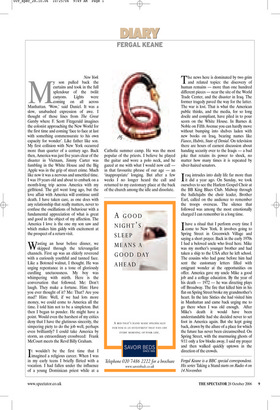New York
Myson pulled back the curtains and took in the full splendour of the twilit canyons. Lights were coming on all across Manhattan. ‘Wow,’ said Daniel. It was a slow, unabashed expression of awe. I thought of those lines from The Great Gatsby where F. Scott Fitzgerald imagines the colonist approaching the New World for the first time and coming ‘face to face at last with something commensurate to his own capacity for wonder’. Like father like son. My first collision with New York occurred more than quarter of a century ago. Back then, America was just five years clear of the disaster in Vietnam, Jimmy Carter was fumbling in the White House and the Big Apple was in the grip of street crime. Much like now it was a nervous and unsettled time. I was 19 years old and about to embark on a month-long trip across America with my girlfriend. The girl went long ago, but the love affair with America will continue until death. I have taken care, as one does with any relationship that really matters, never to confuse the oscillations of behaviour with a fundamental appreciation of what is great and good in the object of my affection. The America I love is the one my son saw and which makes him giddy with excitement at the prospect of a return visit.
Wasting an hour before dinner, we skipped through the televangelist channels. First up was an elderly reverend with a curiously youthful and tanned face. Like a Botoxed walnut, I thought. He was urging repentance in a tone of gloriously curdling unctuousness. My boy was whimpering with mirth. Here is the conversation that followed. Me: Don’t laugh. They make a fortune. Him: Have you ever thought of it? Me: That? Are you mad? Him: Well, if we had lots more money, we could come to America all the time. I told him not to be a simpleton. But then I began to ponder. He might have a point. Would even the harshest of my critics deny that I have the glutinous sincerity, the simpering piety to do the job well, perhaps even brilliantly? I could take America by storm, an extraordinary crossbreed: Frank McCourt meets the Revd Billy Graham.
It wouldn’t be the first time that I imagined a religious career. When I was in my early teens I briefly flirted with a vocation. I had fallen under the influence of a young Dominican priest while at a Catholic summer camp. He was the most popular of the priests. I believe he played the guitar and wore a polo neck, and he gazed at me with what I would now call in that favourite phrase of our age — an ‘inappropriate’ longing. But after a few weeks I no longer heard the call and returned to my customary place at the back of the church among the idle and dissolute. The news here is dominated by two grim and related topics: the discovery of human remains — more than one hundred different pieces — near the site of the World Trade Center, and the disaster in Iraq. The former tragedy paved the way for the latter. The war is lost. That is what the American public thinks, and the media, for so long docile and compliant, have piled in to pour scorn on the White House. In Barnes & Noble on Fifth Avenue you can hardly move without bumping into shelves laden with new books on Iraq, bearing names like Fiasco, Hubris, State of Denial. On television there are hours of earnest discussion about handing security over to the Iraqis — a bad joke that retains its power to shock, no matter how many times it is repeated by silver-haired senators.
Iraq intrudes into daily life far more than it did a year ago. On Sunday, we took ourselves to see the Harlem Gospel Choir at the BB King Blues Club. Midway through the hallelujahs the choir leader, Brother Earl, called on the audience to remember the troops overseas. The silence that followed was among the most emotionally charged I can remember in a long time.
Ihave a ritual that I perform every time I come to New York. It involves going to Spring Street in Greenwich Village and saying a short prayer. Back in the early 1970s I had a beloved uncle who lived here. Mike was my mother’s younger brother and had taken a ship to the USA after he left school. The cousins who had gone before him had sent the customary letters filled with emigrant wonder at the opportunities on offer. America gave my uncle Mike a good job and a college education. By the year of his death — 1972 — he was directing plays off Broadway. The fire that killed him in his flat on Spring Street broke my grandmother’s heart. In the late Sixties she had visited him in Manhattan and came back urging me to go there when I was old enough. After Mike’s death it would have been understandable had she decided never to set foot in America again. But she kept going back, drawn by the allure of a place for which the future has never been circumscribed. On Spring Street, with the murmuring ghosts of 9/11 only a few blocks away, I said my prayer and then walked quickly uptown in the direction of the crowds.
Fergal Keane is a BBC special correspondent. His series Taking a Stand starts on Radio 4 on 14 November.


























































































 Previous page
Previous page